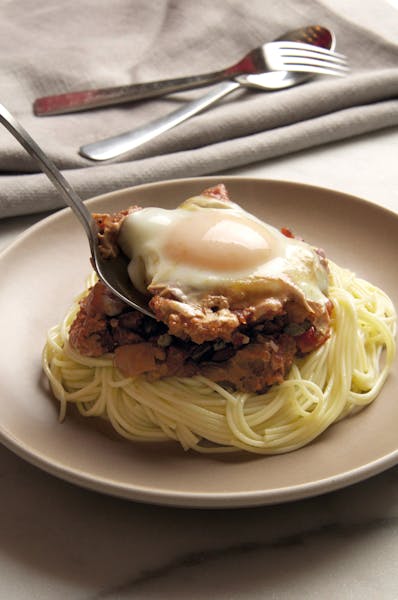What do pancakes, custard and soup stock have in common?
An egg.
No other food serves so many functions, says Michael Ruhlman in his new book "Egg: A Culinary Exploration of the World's Most Versatile Ingredient" (Little, Brown and Co., 236 pages, $40). The Cleveland-based writer, whose extensive body of work often highlights culinary technique, turns his attention to our most useful cooking tool, the simple egg.
Q: What's so important about the egg?
A: It does so many things in the kitchen. The idea behind the book was to explore the notion that if you knew all there was about the egg, you could increase your skills' capacity as a cook by a factor of 10. No single ingredient has so many applications in the kitchen. We tend to take it for granted because they are ubiquitous. They are inexpensive. But that's the very source of their strength. They are a miracle of nutrition, economy, deliciousness and utility. They are so versatile. The egg white is sort of a powerhouse bundle of protein that can create an angel food cake or marshmallows or clarify a stock or give body to a cocktail. There's just no end to what you can do with a humble egg.
Q: The egg got a bad rap a while back.
A: When I was growing up in the '70s and '80s, they were saying eggs were bad for you. This is an example of our stupidity and gullibility. Here is this miracle of nutrition and utility and economy, and we were warned away from it and told that it was bad when, in fact, it's not bad. Eggs have all the nutrition we need. All the stuff that creates life is contained within the fragile shell. When you're eating an egg, you are eating the very stuff of life itself. I tell people at gatherings that we need to pay attention not to news reports and not to nutritionists. No one really knows anything for certain. I ate a lot of eggs while we were testing these recipes, and there were times when my body said "no more eggs." So I didn't eat them. I wish we would just listen to our bodies and eat natural foods that we cook ourselves.
Q: So which came first, the technique or the recipe?
A: Always the technique comes first with me. That's what I care about. We're awash in a sea of recipes. We don't need more recipes. We need more technique. If you know technique, you know a thousand recipes.
Q: What surprises did you discover while working on this book?
A: You can pressure-cook eggs. I found out from someone on Twitter. If you pressure-cook them on low for 7 minutes, they pop right out of the shell (great for egg salad). If you want to do a soft-boiled egg with a hard white but a runny yolk that still looks like a whole egg, it's a great way to do it as well, because it's much easier to peel.
And you can cook an egg in a plastic bag. I also heard about that on Twitter. It's a novelty recipe in the book, but it keeps the egg really compact. If you wanted to have a poached egg for lunch you could do it earlier in the bag and bring it to work.
Q: What's the key to handling eggs when cooking them?
A: The most common mistake is cooking them at too high a heat. Eggs like gentle heat. If you hard-boil an egg, you have this rubbery dense product, which is fine if that's what you want. But if you want really delicate eggs, you cook them very, very gently and they'll be very soft and tender, whether you are sous videing them at 140 degrees or scrambling them over very low heat, creating these tender curds. We overcook scrambled eggs; it's probably the most overcooked item in America after the boneless, skinless chicken breast.
Q: Is there any particular function of the egg that you hadn't considered before?
A: Yes, the incredible power of the meringue. It deserves its own flow chart. You could do a whole book on it. When you whip these proteins and they have this capacity to trap little bubbles of air and inflate, you can add sugar and bake this into a crunchy meringue cookie. You can fold in flour and bake it and have an angel food cake. You can poach that meringue in water and have a floating island. You can put it into stock and it will clarify the stock. It's just a wonder what you can do with it. You can add gelatin and you can have marshmallows. There's just no end to what you can do with the egg white alone.
Q: Does it matter which eggs we buy from a nutritional standpoint?
A: No, I don't think it does. I'm not a nutritionist and I haven't personally tested eggs for those with the greatest nutrients. But for the most part, they're all going to be pretty much the same. But it only makes sense that if you get an egg from a chicken that's been loose on an organic pasture, free to forage for bugs beneath the grass and living according to nature, you're going to have a tastier, more nutritious egg.
Follow Lee Svitak Dean on Twitter: @StribTaste

Travis Kelce named host of 'Are You Smarter than a Celebrity?' for Prime Video
West Virginia transgender sports ban discriminates against teen athlete, appeals court says

